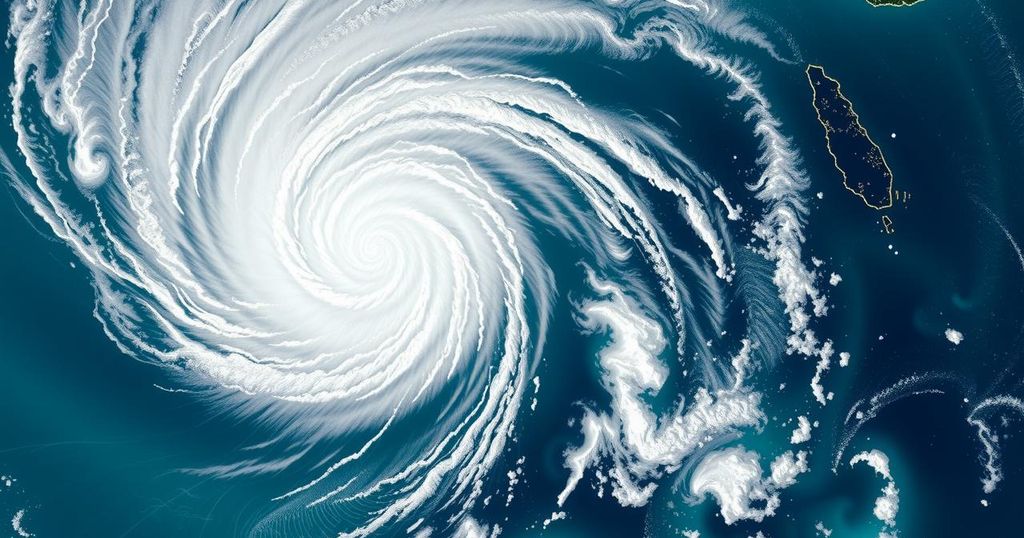Climate change
Global news
AFRICA, ANA CRISTINA, CHI, CHIDO, CLIMATE CHANGE, DIANA, DISASTER MANAGEMENT, EUROPE, FRANCE, FREDERIC LEGUILLIER, INTERIOR MINISTRY, MAYOTTE, MOZAMBIQUE, MOZAMBIQUE NATIONAL METEOROLOGICAL INSTITUTE, NAMPULA, NATIONAL EMERGENCY OPERATIONS CENTER, NATIONAL WEATHER SERVICE, NATURAL DISASTER, NATURAL DISASTERS, PARIS, RAIN, ZIMBABWE
Marcus Li
0 Comments
Cyclone Chido Threatens Indian Ocean Islands and Mozambique’s Coast
Cyclone Chido is anticipated to significantly affect the Indian Ocean islands of Comoros, Madagascar, and Mayotte, with severe weather conditions expected. Precautions have been instituted across the affected regions, including red alerts in Mayotte and Mozambique, with millions at risk from the cyclone’s destructive path. Emergency services and evacuation efforts highlight the gravity of the situation as authorities brace for potentially catastrophic impacts.
The Indian Ocean islands of Comoros, Madagascar, and Mayotte are preparing for the impending arrival of Cyclone Chido, an intense tropical storm advancing towards Africa’s eastern coastline. Authorities in Comoros have closed schools in anticipation of the storm’s impact this weekend, while the French territory of Mayotte has been placed under a red alert, the highest warning issued by the French national weather service. As Chido approaches, it is forecasted to pass near the northern coast of Madagascar, prompting additional precautions in that region as well.
The cyclone is expected to hit the African mainland early on Sunday, with Mozambique’s northern provinces of Cabo Delgado and Nampula under a red alert, potentially affecting approximately 2.5 million individuals. Rescues are anticipated, as winds could reach 200 kilometers per hour (124 miles per hour), leading to severe conditions. In Madagascar, cell phone alerts have been disseminated, while evacuations are underway in areas predicted to experience the cyclone’s most intense effects.
Support from the French government includes the dispatch of about 110 personnel to Mayotte, equipped with essential emergency supplies and specialized rescue teams. Emergency equipment and relief materials are also being supplied to Madagascar, in preparation for the damage expected from Cyclone Chido. The cyclone season, typically from December to March, has witnessed increasingly severe storms, with historical precedents indicating the dire consequences of such weather events.
Cyclone Chido is the latest in a series of devastating cyclones that have affected the Indian Ocean region, particularly targets like Madagascar, Comoros, and Mozambique. The cyclone season in this area runs from December to March, a time when the frequency and intensity of storms tend to escalate due to climatic factors, including climate change. Past storms, such as Cyclone Idai and Cyclone Freddy, underscored the severe repercussions such weather phenomena can have on populous regions, including widespread flooding, landslides, and health crises following the storms.
As Cyclone Chido approaches, the Indian Ocean islands and mainland nations are mobilizing resources and implementing precautionary measures to mitigate the potential impact on millions of lives. The multifaceted strategy incorporates closure of schools, issuing alerts, coordination of evacuations, and deployment of emergency aid. With climate change exacerbating the severity of these seasonal storms, ongoing preparedness remains essential in facing such natural calamities.
Original Source: abcnews.go.com




Post Comment